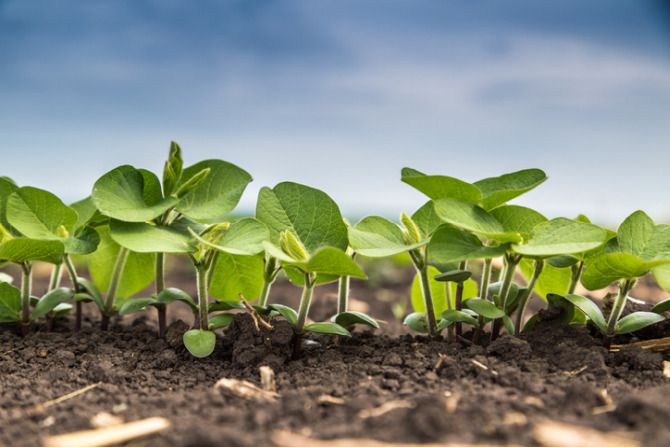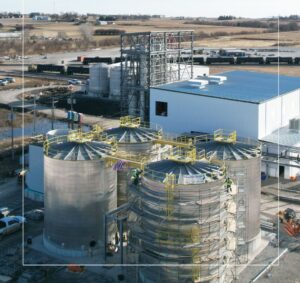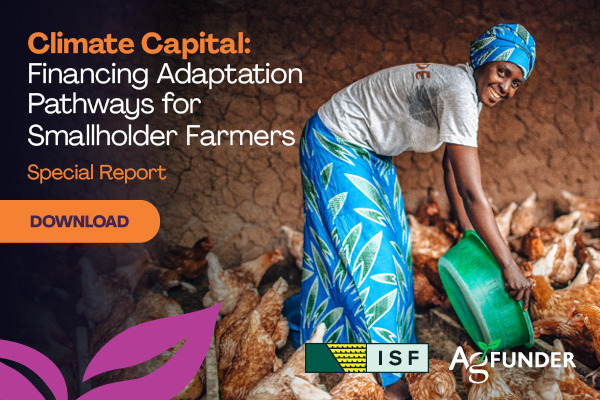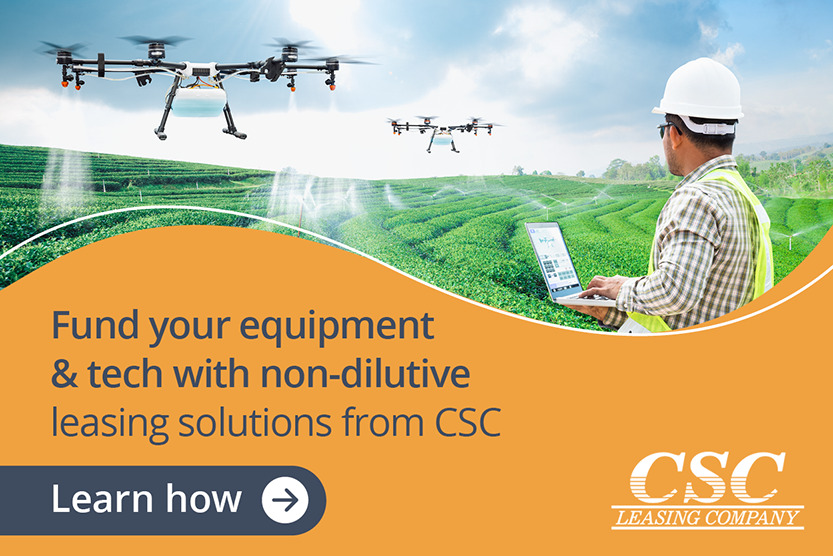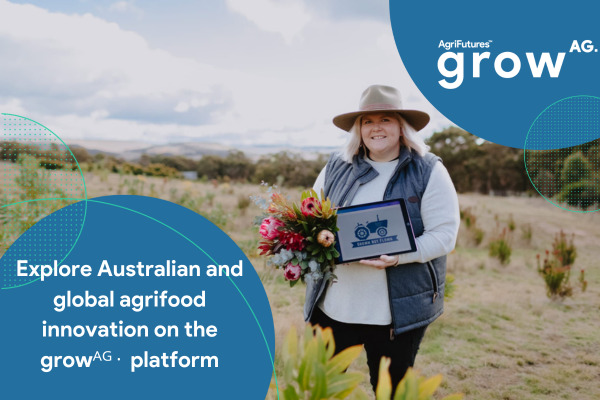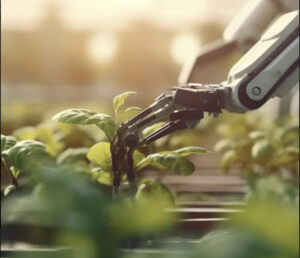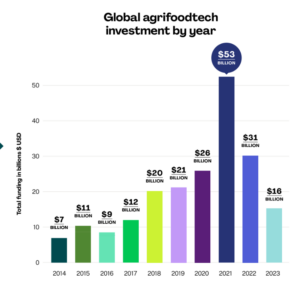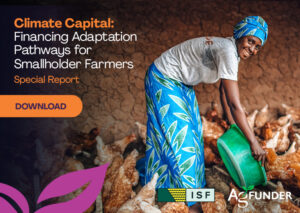Gro Intelligence—a New York- and Nairobi-based startup building what it claims is the world’s largest agricultural data platform—has installed a new CEO to replace founder Sara Menker, and has told its employees that it is unable to pay them, AgFunderNews has learned.
Menker, who controls two board seats, is no longer CEO, but will have “ongoing responsibilities” at the firm she founded in 2012.
CTO James Cariello has been named as the new CEO at Gro, which laid off 10% of its staff at the end of January and has been attempting to raise additional capital through a convertible bond — a bond that can be converted into shares at a later date — as a bridge until it gets more consistent and stable revenues.
The company, individual board members and investors contacted by AgFunderNews have not responded to a request for comment.
Menker had her company slack account deactivated a few days ago, one longtime Gro employee told us. “At an all teams meeting James stated unequivocally that they were unable to pay us.
“We were told that Sara was no longer CEO but as founder would have ongoing responsibilities. These were not enumerated but I gathered from subsequent conversations that these related to business development and fundraising. We were told that [COO] Sewit [Ahdorem] was no longer with the firm in any capacity.”
The call lasted about 10 minutes, “with a promise for more complete transparency,” added the employee.
‘A fundamental mismatch between the product and the market’
Gro, which generates the bulk of its revenues from key customer Unilever, had picked up some business with other packaged food companies and a number of quantitative and fundamental commodities investors, said the source.
“It had positioned itself as a food security platform to a small Asian country and a country in the Middle East exporting oil, without success. It had also attempted to engage the US government under a variety of guises but was only picking up bits and pieces of business here and there.”
While Gro had lost a crop input company as a client, its current woes were not the result of a sudden loss of clients, said the source. “The renewal rates for the commodities investors were excellent.”
Asked what had gone wrong, the source blamed a combination of the challenging funding environment and a “fundamental mismatch between the product and the market.
“They were chasing deals for projects that resembled bespoke consultancy work as opposed to something that would generate replicable revenue streams. They also had a number of mis-hires and until very recently, they didn’t have a CFO, so I don’t know that they were able to produce reasonable financials on a quarterly basis for investors.
“Sara should have brought in an operating CEO probably two years ago.”
‘Like most startups, it tries to be everything to everyone and needs to find its niche’
Founded in 2012 by former agricultural commodities trader Sara Menker, Gro Intelligence is an AI-powered insights company providing decision-making tools and analytics to a range of clients from food & ag companies to governments, insurers, investment banks, consulting firms and universities. It netted an $85 million series B round in January 2021 from backers including Intel Capital and Africa Internet Ventures, and was named as one of TIME’s 100 most influential companies that year.
According to one industry source who spoke to us earlier this month, Gro “has a great product and a good group of intelligent people behind it, but I’m not sure they know how to sell it… I think it’s a solid business and something that the market needs, but it also needs the right people to operate it. Like most startups, it tries to be everything to everyone and needs to find its niche.”
The industry source added: “They started off as a data aggregator of agricultural data and have now incorporated a ton of climate data. The problem is that they are not sure who or what to sell, they have the answer but they do not know which question to ask.
“I haven’t heard that they lost clients; it seems to be more the case that they have not been able to attract as many as hoped. And all those organizations [food & ag companies, financial institutions, gov’t organizations, universities] are clients they target, which goes back to them trying to be everything to everyone. It seems they need to bring in an operator to take the company to the next level.”
Another industry source told us: “Climate tech is an evolving landscape, especially in climate adaptation. COP28 and WEF Davos 24 signaled that adaptation is increasingly seen as a business agenda rather than a government agenda. The outcome of that will be seen in the overall growth of the sector. However, companies that focus on specific business pain points and go deep to solve them through their products will end up doing well.
“The challenges in fundraising/growth that the sector saw last year are no different from the challenges in the broader tech sector on the growth side.”
The world’s largest climate data platform?
Gro Intelligence, which founder Sara Menker recently claimed had “ended up building the world’s largest climate data platform without even knowing it,” scrapes data from governments, trade organizations, weather and geological agencies, commodities and financial markets to provide actionable insights.
To predict crop yields, for example, Gro combines satellite imagery with data on rainfall, drought, vegetative health and density, soil moisture and land surface temperature, and data from USDA’s National Agricultural Statistics Service (NASS), or Brazil’s IBGE, the Brazilian Institute of Geography and Statistics.
In a blog post penned on January 25, Gro said its US corn yield forecast model had been “on average within 98% of the USDA final January report by October [i.e., three months in advance]” over the past eight years, while its US soybean yield forecast model had been “on average within 99% of the USDA’s final number by October for the last six years.”
The blog post went on: “For the two major soybean exporting countries, the US and Brazil, Gro’s predictive yield models were 99.6% and 98.1% accurate for 2023, respectively. In critical global regions where the current marketplace does not have many machine learning-based predictive models such as Ukraine, Brazil, and China, Gro’s 2023 global yield forecast models were on average 96% accurate up to 10 months ahead of final government reporting.”
Explaining why this matters, the company explained: “Yield is the most important supply-side driver of the price of a commodity, and yield forecasts drive changes in the futures price. Governments and agribusinesses rely on such models to help manage foreseeable imbalances between food supply and demand. Financial traders buy or sell financial assets based on their expectations of changes in crop futures prices, and yield models are a significant input to their own predictive financial models.”

